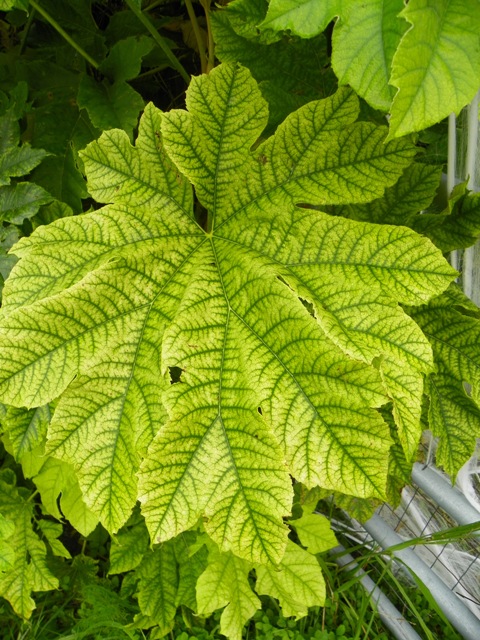Does Your Lawn or Garden Need Lime?
go.ncsu.edu/readext?198358
en Español / em Português
El inglés es el idioma de control de esta página. En la medida en que haya algún conflicto entre la traducción al inglés y la traducción, el inglés prevalece.
Al hacer clic en el enlace de traducción se activa un servicio de traducción gratuito para convertir la página al español. Al igual que con cualquier traducción por Internet, la conversión no es sensible al contexto y puede que no traduzca el texto en su significado original. NC State Extension no garantiza la exactitud del texto traducido. Por favor, tenga en cuenta que algunas aplicaciones y/o servicios pueden no funcionar como se espera cuando se traducen.
Português
Inglês é o idioma de controle desta página. Na medida que haja algum conflito entre o texto original em Inglês e a tradução, o Inglês prevalece.
Ao clicar no link de tradução, um serviço gratuito de tradução será ativado para converter a página para o Português. Como em qualquer tradução pela internet, a conversão não é sensivel ao contexto e pode não ocorrer a tradução para o significado orginal. O serviço de Extensão da Carolina do Norte (NC State Extension) não garante a exatidão do texto traduzido. Por favor, observe que algumas funções ou serviços podem não funcionar como esperado após a tradução.
English
English is the controlling language of this page. To the extent there is any conflict between the English text and the translation, English controls.
Clicking on the translation link activates a free translation service to convert the page to Spanish. As with any Internet translation, the conversion is not context-sensitive and may not translate the text to its original meaning. NC State Extension does not guarantee the accuracy of the translated text. Please note that some applications and/or services may not function as expected when translated.
Collapse ▲Does your lawn or garden need lime? If you live in southeastern North Carolina the answer to this question is a definite maybe. This is because our soils vary so much from one yard to the next. For some yards, lime needs to be added every few years to keep plants healthy. For others, especially those at the beach, adding lime can harm plants.
What is Lime?
Lime is a soil amendment made by grinding limestone, a naturally occurring type of rock that is very high in calcium. Two types of lime are commonly used in lawns and gardens, agricultural lime and dolomitic lime. Agricultural lime, also sold as garden lime, is made from calcium carbonate. This type of limestone can be found in our area and is mined in Pender County at the Shelter Creek Quarry near Maple Hill.
Dolomitic lime is made from dolomite, a type of rock very similar to limestone except it also contains magnesium. In North Carolina, dolomite is found only in the mountains. Both types of lime provide calcium for plants, but dolomitic lime also supplies magnesium, a nutrient often low in soils in our area. Other types of lime you may find for sell include hydrated or slaked lime and quick or burnt lime. These are not recommended for lawns and gardens.
What Does Lime Do?
In addition to supplying calcium, lime makes soils less acidic. Acidic soils, referred to by old timers as sour soils, have a low soil pH. Soil pH levels can range anywhere from 3.0, very acidic, to over 8.0, moderately basic, in our region. Most vegetables, fruits, and ornamental plants grow best when the pH is slightly acidic, between 5.5 and 6.5. At levels lower than this many nutrients become unavailable to plants even if they are present in the soil, while elements like aluminum become too available and can burn roots.
If your soil pH is too low (below 5.5), most plants will not grow well no matter how much fertilizer you add. If your soil pH is already 6.5 or higher adding lime can harm plants by raising the pH too high. This makes nutrients unavailable, resulting in nutrient deficiency symptoms like yellow leaves and stunted growth. This is especially true for acid loving plants like azaleas, camellias, loropetalum, blueberries, and centipede lawns which grow best when the pH is around 5.0-5.5.
How to Tell if Your Soil Needs Lime
The only accurate way to know if your lawn or garden needs lime is to have the soil tested. Soil test kits can be purchased at garden centers or online, but they do not provide accurate results or tell you how much lime you need to add. Fortunately in North Carolina there is an easy way to determine your soil pH and get recommendations for how to adjust it, through our state’s soil testing lab in Raleigh.
Operated by the NC Department of Agriculture, North Carolina’s soil testing lab is one of the largest and busiest in the country. To have your soil tested, collect samples from different areas of your yard. You will need to randomly collect three to five samples from each section of your yard where you grow something different, for example, 3 to 5 samples from your lawn, 3 to 5 samples from your vegetable garden, etc. Samples should be taken around 6” deep. For each sample you are going to submit (example – lawn, garden, flower bed), aim to collect a total of about a cup and a half of soil when the 3 to 5 random samples are mixed together.
Boxes and forms for samples are available from your local Extension office. Completed samples should be mailed to the soil testing lab at the address listed on the box. Samples can be submitted any time of the year and results are posted online at http://www.ncagr.gov/agronomi/pals/. Results are usually ready within a few weeks of submitting.
If your soil test results recommend that you add lime, do so the next time you plan to till the soil. Lime moves very slowly in soil naturally so needs to be mixed in to get the most benefit. In lawns or established landscape beds, pelleted lime can be applied using a fertilizer spreader.
Learn more
Visit your local Cooperative Extension office to learn more about gardening and landscape care. Go to https://www.ces.ncsu.edu/local-county-center/ to find your county Extension center or call to get expert advice:
- If you live in Pender County, call 910-259-1235
- In New Hanover County, call 910-798-7660
- In Brunswick County, call 910-253-2610
- In Onslow County, call 910-455-5873
- In Duplin County, call 910-296-2143





